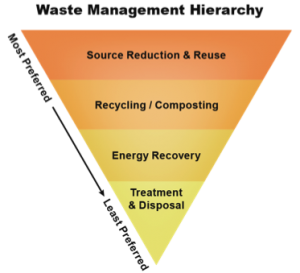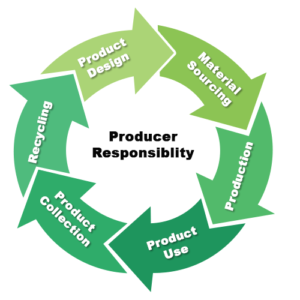The National Waste Management Strategy (NWMS) seeks a common platform for action between stakeholders to systematically improve waste management in South Africa. The country is faced with a rapidly growing, urbanisation and consumerist population but our environment has a finite ability to absorb solid and liquid waste.
Through the country’s commitment to sustainable development, South Africa aims to balance the broader economic and social challenges of a developing and unequal society while protecting our environmental resources. There is a need to eliminate the unnecessary use of raw materials and the need to support sustainable product design, resource efficiency and waste prevention.
This means re-using products where possible; and recovering value from products when they reach their life span through recycling, composting or energy recovery. While the elimination of waste in its entirety may not be feasible, it is possible through the systematic application of the waste management hierarchy to reach a point within the next few decades where, re-use, recycling, recovery and treatment overtake landfills as preferred options for waste management.
The NWMS is a legislative requirement of the National Environmental Management: Waste Act, 2008 (Act No. 59 of 2008), here after referred to as the “Waste Act”. The purpose of the NWMS is to achieve the objects of the Waste Act, which defines its scope and specifies its contents. Organs of state and affected persons are obliged to give effect to the NWMS.
The Constitution of South Africa, 1996 (the Constitution) provides the foundation for environmental regulation and policy in South Africa. The right to environmental protection and to live in an environment that is not harmful to health or well-being is set out in the Bill of Rights (section 24 of Chapter 2). This fundamental right underpins environmental policy and law, in particular the framework environmental legislation established by the National Environmental Management Act, 1998 (Act No. 107 of 1998) (NEMA).
The Waste Act fundamentally reforms the law regulating waste management, and for the first time provides a coherent and integrated legislative framework addressing all the steps in the waste management hierarchy.
The waste management hierarchy provides a systematic and hierarchical approach to integrated waste management, addressing in turn waste avoidance, reduction, re-use, recycling, recovery, treatment, and safe disposal as a last resort.
NEMA introduced a number of additional guiding principles into South African environmental legislation, including the life-cycle approach to waste management, producer responsibility, the precautionary principle and the polluter pays principle. Chapter 5 of NEMA provides instruments for integrated waste management. NEMA also places a duty of care on any persons who may cause significant pollution or degradation of the environment, requiring them to institute measures to either prevent pollution from occurring, or to minimise and rectify the pollution or degradation where it cannot reasonably be avoided. The Waste Act echoes the duty of care provision by obliging holders of waste to take reasonable measures to implement the waste management hierarchy.

The Waste Act establishes Extended Producer Responsibility (EPR) as a regulatory mechanism. EPR applies to instances in which the nature of the waste from products is of sufficient threat to require producers to take responsibility for aspects of a product’s management beyond the point of sale. EPR programmes focus on both the beginning stages of a product’s lifecycle i.e. how to avoid the generation of waste, and on the end stages i.e. how to manage its use and disposal.
There are two main types of EPR initiatives – voluntary initiatives, which account for the majority of EPR schemes in South Africa to date, and mandatory initiatives, which have been initiated or implemented through government regulation. Voluntary initiatives are typically undertaken by industry and are usually aimed at post-consumer waste streams. An example of a voluntary EPR initiative which has worked well is that of the Recycling Oil Saves the Environment (ROSE) Foundation’s used lubricating oil recycling initiative.
The South African Industrial Container Reconditioners Association (SAICRA) was formed through a facilitation initiative by the Recycling Oil Saves the Environment (ROSE) Foundation. ROSE in its mission to extend its influence over oil related waste in ensuring extended producer responsibility, engaged with the drum reconditioning industry trying to reduce the environmental degradation where oil was concerned.
